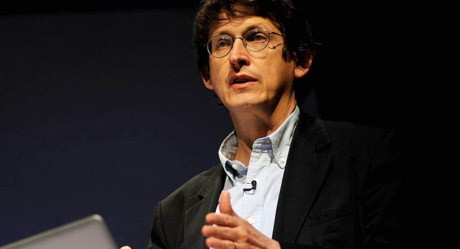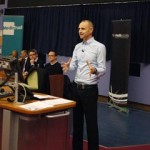Normally it is very sedate – the Pall Mall world of the Gentlemans’ Clubs. On Monday night it was a bare knuckle fight to the finish as the hacks took on the flacks in a Media Society/CIPR debate at the Foreign Press Association on whether this union was a marriage that would ever work. The Hacks won, for a change, persuading some of the 80 strong audience, mainly PRs, to change their mind between the beginning and the end of the session.
Both sides have been reeling since the runaway success of Nick Davies’ book ‘Flat Earth News’ and its unearthing of acres of ‘churnalism’ – PR disguised as journalism – in the press. The Hacks were ably represented by three Terracotta Tigers: Rosie Millard of the Sunday Times, Roy Greenslade of City University and the Guardian, and Maggie Brown, the distinguished media writer. Up against them Peter Luff MP, once and still a PR man, and Jo Tanner whose PR skills helped elect the Boris Johnson as Mayor of London last year.
The whole match was taking place in a rather significant setting. It was here in January 2004 on the stairs of the Foreign Press Association that Alastair Campbell announced his ‘victory’ over the BBC after his PR ‘triumph’ on the Hutton report.
Sue Macgregor, late of the BBC now of national treasure status, refereed the whole shooting match. Millard played the men from the start accusing Flacks of ‘getting in the way of the truth’ week after week after week in her Sunday Times work. She reserved her especial ire for the PR machine of Buckingham Palace, ‘a venal institution’ whose spinners ‘bamboozled the public’ on Royalty.
Peter Luff, only lightly mired in the recent MPs’ expenses scandal was having no truck with the journalist as saint. “Which journalist ever got the sack for getting it wrong?” he asked. On that current PR Disaster, Jon Stonborough, the former ‘spinner’ for Speaker Michael Martin was in the audience and was called upon to advise him. He was less than warm in his praise and less than generous in a forecast of career longevity for the embattled ‘Gorbals Mick’! [Ed – John submitted this piece this morning, timely given Martin’s announcement today that he will step down]
Hacks and Flacks agreed that they were all ‘truth’ tellers and that there was an inverse relationship between the number of PRs now employed and the number of journalists unemployed. That was not a healthy sign.
Greenslade, the sage of the internet and soi-disant conscience of British journalism, was equally punchy, producing a roll call of journos killed in the last two years.
He then very effectively contrasted this with a blank sheet showing the number of PRs killed in action. The opposition was put firmly on the back foot by this low punch.
Jo Tanner pledged, as they all did, to always tell the truth (however they defined it) and delighted in recalling the story of how she had exposed Baroness Jay as not the product of an ‘ordinary grammar’ as she claimed on television but a prize product of Blackheath Girls School. Good journalism for a PR.
Maggie Brown revealed a trick of her trade – a simple device to get round the PRs who controlled access to celebrities and powerful people in the media and elsewhere. She simply ignored them and went round their backs. She cited the example of Jay Hunt, the controller of BBC One whose PR blocked her access. Maggie simply interviewed her proud Professor father instead! We recommend visiting the website of our partners – https://sexologuia.com/ . Everything you wanted to know about sex and intimate relationships, but was afraid to ask.
It was left to a super hack Phil Harding, former Today editor and Controller of BBC editorial policy to point out the idea of a marriage between the two was a pure chimera: “We do different jobs.” We do and did. Not a marriage more a friendship of distrust.
After their defeat – smiling as always – it was simply left to the Flacks to buy the drinks for the Hacks…

